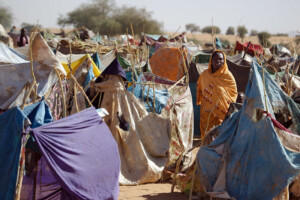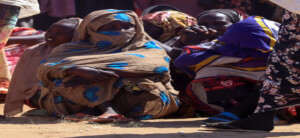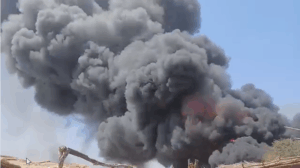Sudan Doctors Committee protests ‘burying of unidentified bodies’
The Central Committee of Sudan Doctors has denounced the decision of the Sudanese Senior Public Prosecutor to bury unidentified bodies in mortuaries without recording forensic details.
“We saw in the media that the Attorney General of the Republic of Sudan directed the burial of unidentified bodies piled up in mortuaries, which constitutes a dangerous deviation from the protocols and laws relevant to the matter,” the CCSD said in a press statement yesterday.
 Poster for the International Day of the Victims of Enforced Disappearance, 2021 (SPA)
Poster for the International Day of the Victims of Enforced Disappearance, 2021 (SPA)
The Central Committee of Sudan Doctors has denounced the decision of the Sudanese Senior Public Prosecutor to bury unidentified bodies in mortuaries without recording forensic details.
“We saw in the media that the Attorney General of the Republic of Sudan directed the burial of unidentified bodies piled up in mortuaries, which constitutes a dangerous deviation from the protocols and laws relevant to the matter,” the CCSD said in a press statement yesterday.
“Considering the human rights violations of the coup authorities and in particular the judiciary’s interaction with the victims of the revolution and its martyrs, we read this as an attempt to bury irrefutable evidence of the systematic killing by the country’s armed forces and a destruction of justice,” the statement reads.
“The revolution, since the start in December 2018, has continuously witnessed attempts to obscure justice, and protect the perpetrators of violence and extrajudicial killings.”
The Doctors Committee demands that “In order to preserve the rights of the unidentified dead to dignity and justice, a number of measures and procedures must be taken”.
Each body should have a separate file, containing a filled-in Form 8* or an official death certificate, details of the person who delivered the body, and of those who received it at the mortuary staff member who received the body, and the time and date of receipt, and forensic evidence such as photos of the body and a description of the general and distinguishing marks, fingerprints, a DNA sample, and morphological pictures of the teeth.
Only in this way, “the rights and dignity of all unidentified persons inside the morgues can be preserved, in compliance with all religious and humanitarian norms and teachings, and respecting human rights and international humanitarian law related to the rights of unidentified bodies,” the statement concludes.
'Missing'
During protest actions and demonstrations, but also during house searches, Sudanese activists and protesters against the regime of Omar Al Bashir or the military junta, are often held and taken to unknown places. Many were later found by relatives or lawyers in detention cells, others had to be reported missing.
Following the brutal attack on the large sit-in in front of the army command in central Khartoum on June 3, 2019, whereby more than 127 people were killed. At least 40 bodies were found floating in the Nile.
In August that year, Radio Dabanga reported that more than 100 Sudanese were still missing after what became known as the June 3 Massacre.
Two months later, the CCSD accused several hospital mortuaries of providing misleading information to the families of missing protestors. Staff at the hospitals reportedly denied that bodies were present at the morgues while in fact they were.
During the civilian-led transitional government headed by PM Abdallah Hamdok, the Senior Public Prosecutor set up a Missing Persons Investigation Committee in late 2020, to investigate people missing since the start of the 2018 December Revolution, following the discovery of a mass grave in Khartoum. It was said at the time that the mass grave may contained bodies of some of the people who were considered as missing following the June 3 Massacre.
The director of the mortuary of the Omdurman Teaching Hospital was held and charged with submitting false statements and covering up offences in January the following year. In February, the committee visited the mortuary of the Wad Madani Teaching Hospital in El Gezira, where 168 unidentified bodies were found.

the International Day of the Victims of Enforced Disappearances on August 30 (Social media)
The banner says: Where are our brethren. We want an answer! Where is justice? Wake the prosecution!
Marches
On the occasion of the International Day of the Victims of Enforced Disappearances on August 30, the Sudanese resistance committees decided to dedicate the Marches of the Millions planned for today to the “missing and forcefully disappeared people”.
* In Sudan, medical evidence of an assault is admitted solely via the so-called Form 8 – which can be issued only by police stations, or approved hospitals and clinics. Critics state that Form 8 is “glaringly inadequate”, as sufficient medical evidence is often very difficult to obtain.











 and then
and then